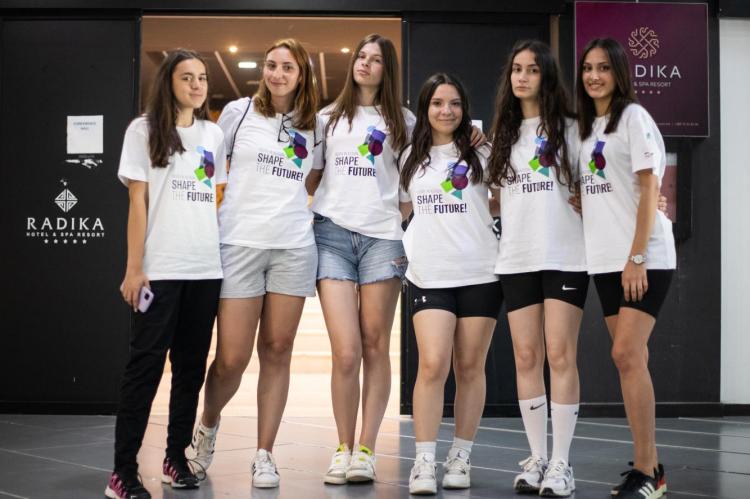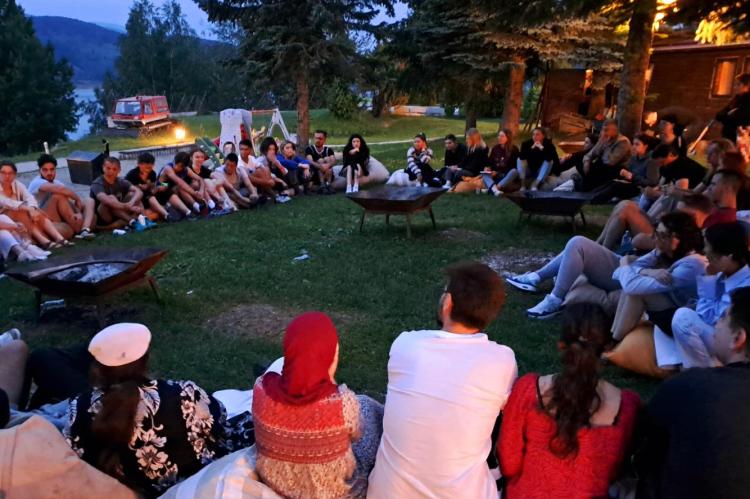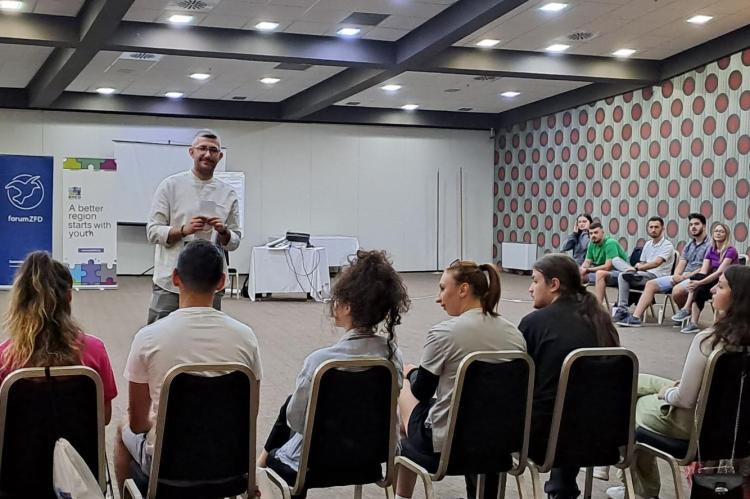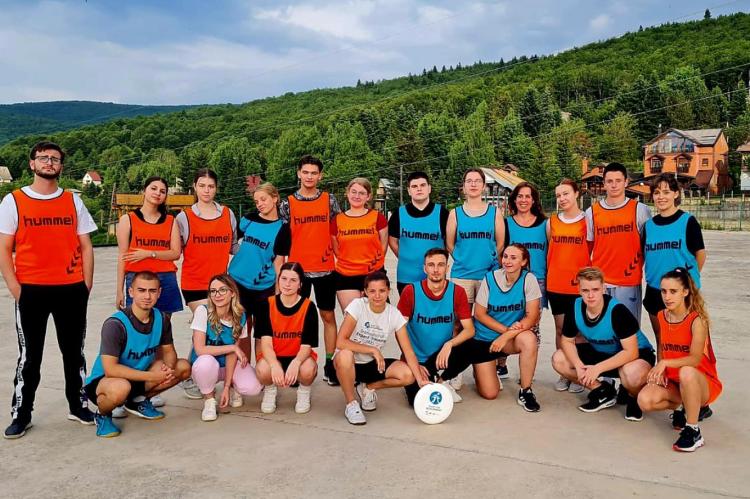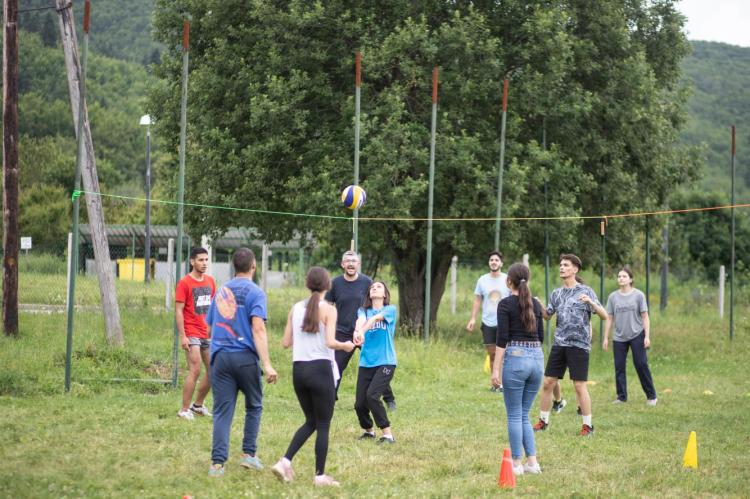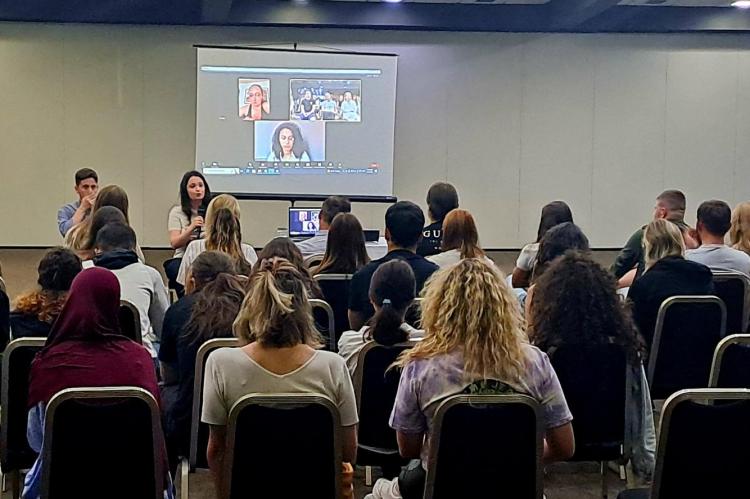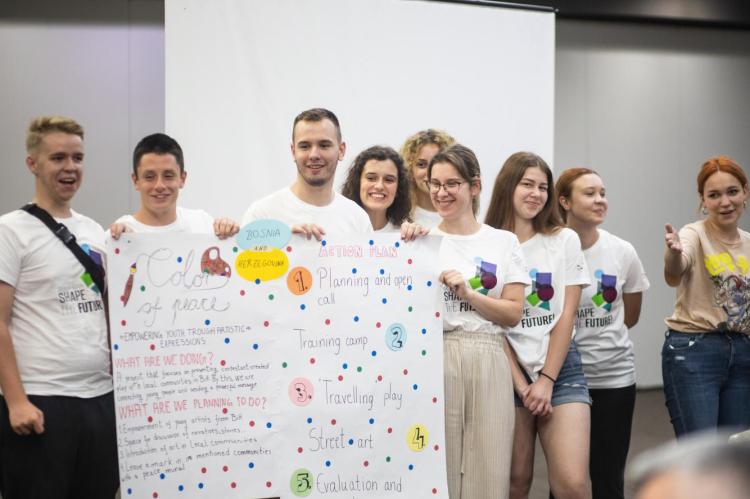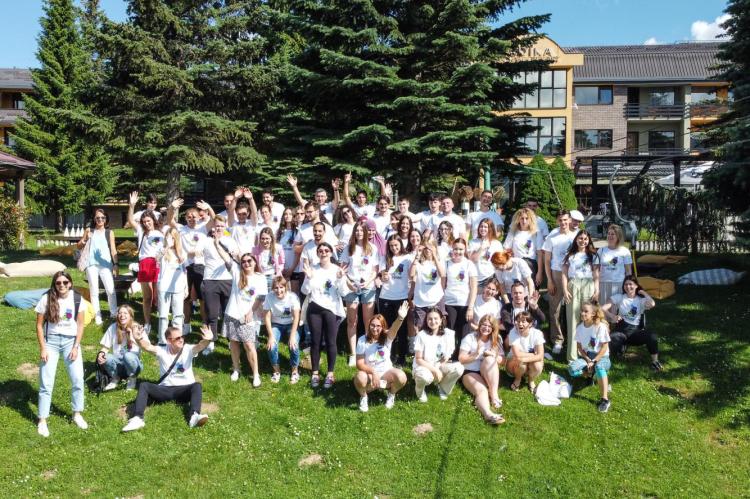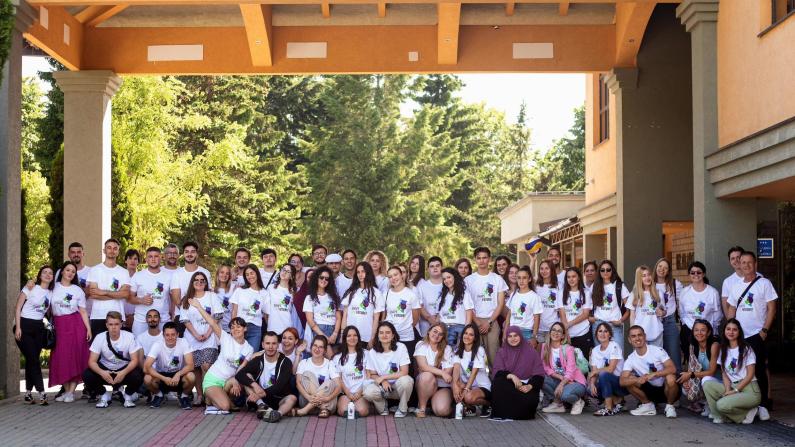
July 3, 2023: It is 7:30 p.m. on Monday evening when the last bus with the participants from Albania and Montenegro made the winding journey to the conference center. The spacious hotel with the euphonious name "Radika - Hotel & Spa Resort" is located above Lake Mavrovo and offers a fantastic view of the lake and the mountains, which belong to the largest national park in North Macedonia in the north-west of the country. The young people and young adults seem slightly exhausted from the trip. They move into their double or triple room and strengthen themselves at the evening buffet. There they meet the other participants who have arrived in the course of the afternoon.
Biljana Miladinović, project manager of Pro Peace in Sarajevo, breathes a sigh of relief. She had the longest journey with her group from Bosnia and Herzegovina. They traveled around 14 hours by minibus and crossed the borders to Montenegro, Albania and North Macedonia. It was a small logistical challenge to organize the journey of the 55 young activists, who come from all six countries of the Western Balkans, in several bus trips from Albania, Serbia, Bosnia and Herzegovina, Kosovo, Montenegro and North Macedonia. Biljana's colleague Neal Raimi, who works as a project manager for Pro Peace in Skopje (North Macedonia), is also happy that everyone has arrived safely. Together with her Pro Peace colleagues Biljana Miladinović (Sarajevo) and Ann-Kathrin Ebinger (Prishtina) as well as the regional partners RYCO (Regional Youth Cooperation Office) and GIZ (German Society for International Cooperation), she put together the group of participants and planned the travel, accommodation and program for the five-day summer camp in Mavrovo.
Young people become multipliers
It is not the first camp of this kind that Pro Peace has organized. Since 2016, camps for young peace activists from the Western Balkans have been taking place in cooperation with local and regional partner organizations, initially under the title "Challenge History" and later under the title "The Future We Want". But this year there is something special: "It is the first time that we are organizing the youth camp in cooperation with RYCO and GIZ," explains Neal, who works for Pro Peacein Skopje. “Pro Peace works with peace experts in Serbia, Kosovo, North Macedonia and Bosnia and Herzegovina. Thanks to the cooperation with RYCO and GIZ, young people from Albania and Montenegro can also take part in the youth camp for the first time. It's an attempt to bring our activities together a bit with the same target group across the region. Of course, that requires a few additional agreements and wasn't always easy," she says with a smile.
However, the organizers always had the common goal clearly in mind: The young people should be equipped with knowledge, methods and skills on the topics of peace building and conflict management, inclusion and sport, participation and project planning. In this way, they can themselves become multipliers in civil society within their local networks, actively promoting peaceful and respectful coexistence. Empowerment is the keyword that probably best describes it.
After dinner, everyone meets for the first time in the large conference room. They will be welcomed by Vladimir Gjorgjevski (RYCO), Harald Schenker (Pro Peace) and Filip Ivanovski (GIZ). "You are young. You are involved. You can actively help shape a better future,” is the message from the organizers. For tonight there is not much else on the program apart from the welcome and a few organizational information. Signature lists must be filled out. And there is a gym bag for everyone with the imprint "Youth in Action - Shape the Future". This is this year's motto and means something like: Youth in action - shape the future! The gym bag contains a drinking bottle, a notebook, a pen and a T-shirt.
Find a common language
One of the prerequisites for participation was sufficient knowledge of English. This is understandable, since the diversity of the Western Balkans is not only reflected in different religions, cultures and ethnic groups, but also in terms of language. English as the common working language thus serves to ensure that everyone can understand each other – perhaps even in two senses: because the respective languages are also part of the tensions between ethnic groups. The languages are also used by the political elites in the Western Balkans for their nationalist aspirations, which further fuels the conflicts in the region. "We are aware that this means that not everyone can take part, but it is not possible without knowledge of English," says Neal Raimi from Pro Peace.
The local partner organizations of RYCO, Pro Peace and GIZ selected the participants from their ongoing youth projects. All of them are already involved in their neighborhood, school, local authority or community. "However, it was also important for us to select young people who might otherwise never have had the chance to take part in a camp like this," adds Neal. A total of 15 young people come from North Macedonia, Serbia, Bosnia and Herzegovina through the project activities of the local partner organizations of Pro Peace. RYCO and GIZ chose the other participants. "When we started planning, we assumed 100 participants, but unfortunately the project funds weren't enough for that," explains Neal. Now there are at least 55 young people who have the chance to take part in the peace-building workshops and activities.
In the evening, fire bowls are lit on the hotel grounds. Surrounded by mountain ranges, the lake shimmers at dusk. It looks cozy as the young people sit on the beanbags around the fire. The first talks and encounters take place. This informal meeting and getting to know each other are also part of the project.
Thinking about your own identity
The next morning, we start right after breakfast. At 9 a.m. everyone sits in a huge circle of chairs and waits to see what happens. Coach Nenad Andrić asks the participants to state their name, from whom they got the name and what it means. Many got their names from their grandmother or grandfather. "What actually defines us? What is unique about us? What does it mean to have an 'identity'?” These are the questions this morning.
An important topic. "Through our identity, we feel part of a group of people with similar identity characteristics, or even alien if nationality, language, religion, culture, level of education or other characteristics differ greatly from one another," explains Nenad. The task for the participants: They should now paint 'identity flowers' with many petals and present their works of art to each other. This makes the great diversity in the group visible.
Jasmila writes in her petals: Bosnian, daughter, sister, Muslim, loves books, language student, left-handed, loves travelling, artist (acting, singing, writing). Another participant describes himself as follows: 25 years old, Kosovo, Balkan Egyptian (Editor's note: the "Balkan Egyptians" in English "Egyptians" are one of the ethnic minorities in Kosovo), human rights activist, tough, teacher, non-religious.
"Some of our character and identity traits change over the course of our lives, others do not," explains coach Nenad. Thinking about individual identity in this way creates mindfulness in dealing with other participants in a diverse group. Because we recognize: "Aha, there are many differences, but depending on which petals you look at, we also have a lot in common across social, religious, ethnic or cultural differences." With a saying from South African philosophy, he dismisses the group in the coffee break: "Ubuntu" means something like: "I am who I am because of you".
Reconciliation through conflict transformation
After the break, the large group splits into three small groups. Each small group will attend three workshops one after the other. The three organizers RYCO, GIZ and Pro Peace each took on the planning and implementation of one workshop.
The Pro Peace workshop deals with the topic "Reconciliation through conflict transformation" and is also led by Nenad Andric. “What do we mean by a conflict anyway?” he asks the group. He lives in Prishtina (Kosovo) and, as a freelance trainer, has many years of experience in the field of conflict management and reconciliation. The 18 participants of the small workshop let the question go through their heads. Then some keywords come to mind: disagreement, disrespect, lack of understanding, different perspectives, crossing borders, hate, competition, structural oppression... These are just some of the answers mentioned. A clear definition of the term "conflict" seems to be difficult.
What is clear, however, is that it is about a relationship between two or more actors who pursue different interests and whose realization is not possible at the same time without harming the interests of the other. Conflicts can also be visible or invisible. They can escalate or smolder beneath the surface. Using conflict examples, the participants carry out a conflict analysis. What is at the heart of the conflict? Who are the actors involved? What processing strategies are there and what chance of success do they have?
“The theoretical background knowledge is important”
A marriage crisis, the Iraq war, the dispute in a household over the water supply and also the Russian war of aggression against Ukraine serve as examples that the participants chose themselves in small groups. Trainer Nenad explains the different types of conflict, for example distribution conflicts, relationship conflicts, conflicts of interests or conflicts of values. He also practices the method of "actor mapping" with the group using the example of the Iraq war.
Not a simple example, as the group quickly realizes. Too many actors, too many bilateral and multilateral tensions, interests, relationships. This is not an exercise with a satisfactory answer. But the example shows how complex conflicts can be. With the help of the so-called "onion model" the trainer explains that each conflict actor has their own positions, interests and needs. He asks his attentive listeners about the positions, interests and needs of the conflicting parties Kosovo and Serbia. Do both actors have common needs?
“All this conflict analysis and theoretical background knowledge is important when we are planning an intervention,” affirms Nenad. “Finding a compromise always means that both parties to the conflict have to give up something. This is the only way that different interests can be protected, and the relationship can remain in balance. Not endangering the relationship with the other parties to the conflict, but still safeguarding your own interests, that can be the goal of conflict management. Through dialogue, mediation or dispute settlement, conflicts can be dealt with non-violently and escalation avoided”. An important and intensive workshop. The participants go into the lunch break thoughtfully.
In the afternoon it gets sporty
“Sport for development. Interculturality and social inclusion” – the title of this afternoon workshop sounds exciting. A few participants have put on their sports gear, others look a little unsure of what to expect. The sun is beating down on the sports field above the hotel and it smells like sunscreen. This workshop is part of the GIZ program in the Western Balkans. It is instructed by Nadica Jovanovik. It should be about intercultural communication and social inclusion. The trainer wants to know what intercultural communication means. Listening, understanding of other points of view, openness, change of perspective, respect and tolerance are mentioned.
Then it starts. In the first part, two teams compete against each other. Each team has to complete a total of nine stations with tasks. The most important thing is to find solutions together as a team. The first team to solve all the tasks wins. The competitive character is immediately there. The tasks are on small slips of paper at each station. Who reads, who listens, who makes the announcements, who finds the answers? It quickly becomes clear what is actually going on. It's not about winning. Communication in the team is crucial. If everyone is heard, can we find a solution together, who makes the decisions? Not so easy if everyone doesn't speak the same language and have different abilities, some loud and briskly, others more reserved and quieter.
In the second part of the workshop, Nadica wants to know what the group understands by social inclusion. Include everyone, no exclusion, equal opportunities for all. In theory, this all sounds plausible. And then "Ultimate Frisbee" is played. In this competitive team sport, two teams compete against each other and try to score points. Of course, it's also about fairness, respect and cooperation between the players. The special feature: There is no referee.
A rule change leads to discussions
It quickly becomes apparent that individual players often have the disc in their hands and score points, while others are more on the sidelines. Suddenly the rule changed. All players on a team must touch the Frisbee once before a point can be scored. Discussions ensue. Was that a point or not? You disagree. The teams turn to Nadica for help. She just smiles and shrugs. The teams have to find a solution themselves.
In the final round, everyone is asked to reflect on their own behavior once again. In game and under competitive conditions, did I pay attention to what we discussed earlier? What role did I play? Was everyone equally seen, heard, valued and included? Were individual players favored or disadvantaged because of their physical characteristics? Self-reflection suffers a bit given the heat on the pitch. "Sometimes it takes a few hours or days for the participants to understand what the workshop was actually about," smiles Nadica. For them, too, it is always an exciting experience to observe the behavior of the players.
The participants develop their own projects
On the next day of the youth camp, the third workshop “Community Engagement” will take place. Dragan Markoski and Mirlinda Alemdar, both from PeaceCorps in North Macedonia, together with RYCO, conduct these trainings with young adults more frequently. “It's about giving the young activists knowledge about how they can participate in decision-making processes. To do this, it is necessary to take a closer look at the individual forms of engagement and the levels of participation.”
Information, advice or obtaining specialist expertise are forms of citizen participation, but these are only preliminary stages, explains Dragan. “Real participation begins when citizens can take part in decision-making processes. This can be a form of cooperation and co-determination, but it can also be the partial or complete transfer of decision-making powers to a group or community. This is the highest step on the ladder of participation. Citizens are empowered to make their own decisions. Therefore, in this case we also speak of empowerment.”
Dragan explains to the young activists that not everything is real participation, even if it sometimes looks like it. Some decision-makers pretend that they let young people participate. But that often only serves decorative and, in the worst case, even manipulative purposes.
After a short break, Dragan asks the participants to create a first small project plan. "What situation do you want to change? Who do you want to work with and what methods do you want to use?” It doesn’t take long for the young activists to draft the first project outlines and discuss them in small groups. Later, they should have the opportunity to further refine their project ideas.
After the many intensive discussions and food for thought in the workshops, the participants finally have a free afternoon to get to know each other better. They play volleyball, swim in the pool, relax on the terrace, laugh and talk a lot.
Young activists tell inspiring stories
On Thursday morning, everyone comes back together in the large conference room, still a bit tired but in a good mood. Three special people are guests this morning: Young activists from the Western Balkans who are successfully working for change in their society in very different ways.
For example, 21-year-old Blendi Hodai from Tetovo (North Macedonia). Blendi, who describes himself as an incorrigible optimist, wants to inspire others to get involved. He tells of the beginnings of his commitment during his school days. It all started with a small protest movement in the student body. “At the time, we didn't agree that the school director alone should decide where we go on our annual school trip. We wanted to have a say. There were many decisions in the school system that were unfair and made from above.” Blendi and his classmates didn’t want to accept that any longer.
What started out as a small movement quickly turned into a nationwide movement supported by students with the aim of strengthening the rights of all students in North Macedonia and improving their participation in political decisions. They founded the organization UNSHM (Union of High-School Students of North Macedonia) in 2017 to give students a voice. Today they are committed to a fairer education system and the rights of students. The representatives of UNSHM see themselves as mouthpieces for all students in North Macedonia.
"People put me in boxes"
26-year-old Nikolina Gagić from Srebrenica in Bosnia and Herzegovina is online. She knows all eyes are on her now as she begins to talk. She put on make-up and did her fingernails. Her hairstyle is perfect. "Politics was not important to me before," she says. “But at some point I realized that politics affects everything in our daily lives, and that comes with limitations. For example, sometimes I just say my name and people associate it directly with a certain nationality, religion and ethnic group. They then put me in one of those boxes.”
The activist explains how important it is to her to be seen as an individual. She wants to express her personality through the way she dresses and uses her make-up. "For me, individualism is also a form of activism," she emphasizes. She studied acting and has been involved in numerous organizations for ten years, including peace and human rights.
Erta Prifti was a young activist in Albania at the age of 13. She later got the chance to work with various international NGOs and became a founding member of the U.S. Embassy Youth Council in Albania. This NGO has set itself the goal of involving young Albanians from all social classes more in socio-political dialogue. Erta reports on her educational work with young activists in Albania and on her hope that the participation and co-determination of the younger generation will contribute to change in their society.
First project ideas arise
For three days, the participants were able to be inspired by others and learn, hear, see, try out and discuss a lot. Regardless of their country of origin, ethnicity, language or religion, they exchanged ideas in small groups and developed ideas on how they can contribute to change and peace as part of civil society. In the last part of the conference, the young people are now reunited with the people from their country of origin.
Creativity is now required: All six groups are given the task of developing their own project and presenting it later in the plenary session. A grid with questions on project planning serves as an aid: project title, project goals, region, target group, activities and schedule. Don't forget the budget planning. Everyone is eager to get to work. "Of course we don't expect perfect project plans," says Anja Bebekovska, program officer at RYCO in Skopje (North Macedonia). “The participants now have the time and opportunity to deal intensively with the topics that move them as a group. The project plan helps them to structure their thoughts and ideas. And who knows, maybe the first project ideas will arise that will later become reality.”
A better future is possible
In fact, the project ideas presented later are characterized by a colorful variety. For example, the Albanian group has developed a project for young qualified people to help prevent them from emigrating from Albania. With various activities they want to inform the younger generation about professional perspectives and opportunities in Albania.
The young people from the Bosnian group want to offer the young generation in their country a platform through art and various creative workshops to network with each other and exchange different narratives and perspectives (e.g. through theater or street art projects). The Serbian group is pursuing a different approach with their idea of holding a five-day sports camp. 20 participants of different ages and with diverse backgrounds are invited to take part in sporting and health-promoting activities once a year. In addition to team building, the focus will also be on healthy eating. Parallel storytelling or film workshops are intended to create awareness of different identities. Dialogue and encounters, art and culture, sport and health, encounters and togetherness – the other three project ideas from Kosovo, North Macedonia and Montenegro also go in this direction.
"I will tell others about it"
For five days, the young adults embarked on a varied, intensive and demanding program. They proudly accept their certificates on the last evening. In the workshops, the young people between the ages of 16 and 25 strengthened their peace and conflict management skills and gained knowledge and skills on all aspects of conflict management, interculturality, participation and empowerment. “I will tell others about it and now I want to work even more actively with young people for a peaceful change in society,” says one participant enthusiastically. "I think the work you do is really great," says one participant, pointing to the organizers. "I want to work in such an organization later."
The final karaoke evening with a colorful mix of modern international songs and traditional folk songs from the Western Balkans shows that happy and exuberant celebrations are also possible across borders.
“Through my participation in this camp I was able to develop mentally and personally. It was great and I want to tell you that you can always count on me and I'm always willing to contribute to any project. I look forward to further cooperation. Thanks again for everything.” (Enis, 19, Bugojno/ BiH)
“For me, peace means living in harmony with the people in my neighborhood and society. For me, this also means that we respect and accept one another. I took part in the Youth Camp because it helps me to get to know different perspectives. I can also develop personally and professionally. And here I have the chance to meet new people and learn from them. I think that this experience has made me even more open and open to others." (Visar, 25 years old, Kosovo)


